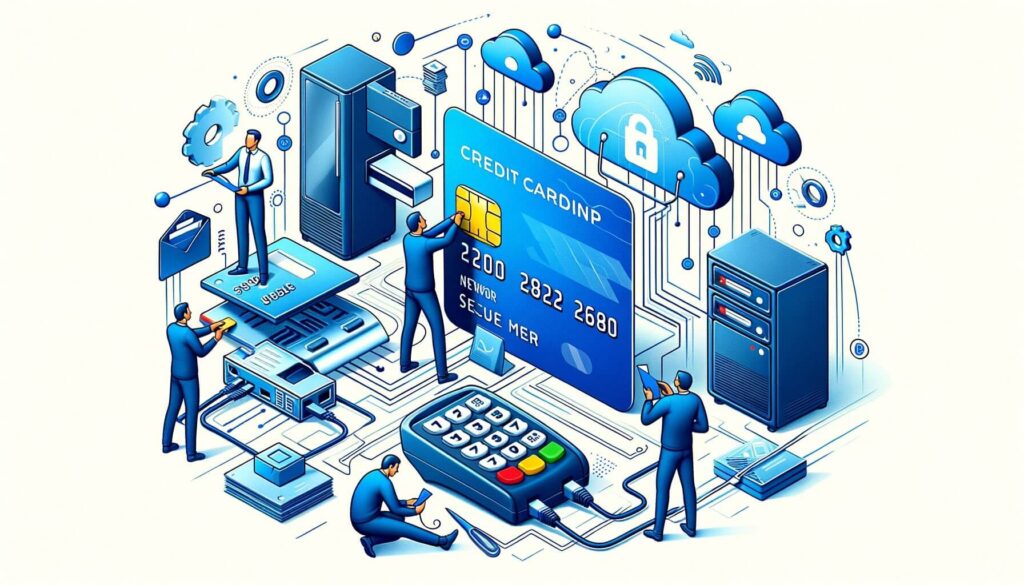
By ReaganRAnderson May 15, 2025
In today’s digital age, accepting credit card payments is essential for small businesses looking to stay competitive and attract customers. Credit card processing allows businesses to accept payments from customers using credit and debit cards, providing convenience and flexibility for both parties.
However, navigating the world of credit card processing can be overwhelming for small business owners who may not be familiar with the ins and outs of the industry. This comprehensive guide aims to provide small business owners with the knowledge and tools they need to successfully navigate credit card processing and optimize their payment systems for success.
Understanding the Basics of Credit Card Processing

Credit card processing is the process of electronically verifying and authorizing credit card transactions between a merchant and a customer’s credit card issuer. When a customer makes a purchase using a credit card, the merchant submits the transaction information to a payment processor, who then communicates with the credit card network and the customer’s bank to verify the transaction and transfer funds from the customer’s account to the merchant’s account.
There are several key players involved in the credit card processing ecosystem, including the merchant, the payment processor, the credit card network (such as Visa or Mastercard), and the customer’s bank. Each of these entities plays a crucial role in ensuring that credit card transactions are processed securely and efficiently.
Choosing the Right Credit Card Processor for Your Small Business

When it comes to choosing a credit card processor for your small business, there are several factors to consider. It’s important to research different payment processors and compare their fees, services, and features to find the best fit for your business. Some key considerations when choosing a credit card processor include:
– Fees: Different credit card processors charge different fees for their services, including transaction fees, monthly fees, and equipment costs. It’s important to understand the fee structure of each processor and choose one that offers competitive rates and transparent pricing.
– Services: Some credit card processors offer additional services such as fraud protection, chargeback management, and reporting tools. Consider what services are important to your business and choose a processor that can meet your needs.
– Integration: If you already use a point-of-sale system or e-commerce platform, make sure that the credit card processor you choose is compatible with your existing systems. Seamless integration can save time and streamline your payment processes.
Setting Up Your Credit Card Processing System

Once you’ve chosen a credit card processor for your small business, the next step is to set up your credit card processing system. This involves obtaining the necessary equipment, such as a credit card terminal or card reader, and connecting it to your payment processor’s network. Depending on your business’s needs, you may also need to set up an online payment gateway for accepting credit card payments online.
It’s important to follow the instructions provided by your credit card processor to ensure that your equipment is set up correctly and securely. You may also need to complete a merchant account application and undergo a credit check to establish a merchant account with your processor.
Accepting Credit Card Payments in Person

Accepting credit card payments in person is a straightforward process that involves swiping or inserting the customer’s credit card into a card reader or terminal. The terminal communicates with the payment processor to verify the transaction and process the payment. Once the transaction is approved, the customer can sign a receipt or enter their PIN to complete the purchase.
It’s important to follow best practices for accepting credit card payments in person, such as verifying the customer’s identity and checking for signs of fraud. You should also train your staff on how to use the credit card terminal and handle customer transactions securely.
Accepting Credit Card Payments Online
Accepting credit card payments online requires a different set of tools and processes than in-person transactions. To accept credit card payments online, you’ll need to set up an online payment gateway that securely processes transactions on your website. The payment gateway encrypts the customer’s payment information and communicates with the payment processor to authorize the transaction.
When setting up an online payment gateway, it’s important to prioritize security and compliance to protect your customers’ sensitive information. Make sure that your website is PCI compliant and that you use encryption technology to secure online transactions.
Understanding Credit Card Processing Fees
Credit card processing fees can vary widely depending on the payment processor you choose and the type of transactions you process. Common fees associated with credit card processing include:
1. Transaction fees: A flat fee charged for each credit card transaction processed by your business.
2. Interchange fees: Fees charged by the credit card networks for processing transactions. Interchange fees are typically a percentage of the transaction amount plus a flat fee.
3. Monthly fees: Recurring fees charged by the payment processor for maintaining your merchant account and providing services.
4. Equipment costs: Fees for purchasing or leasing credit card terminals, card readers, and other equipment needed for processing payments.
It’s important to understand the fee structure of your credit card processor and negotiate competitive rates to minimize costs for your business. You can also take steps to reduce credit card processing fees, such as encouraging customers to use debit cards or implementing surcharges for credit card transactions.
Ensuring Security and Compliance in Credit Card Processing
Security and compliance are critical considerations when it comes to credit card processing for small businesses. Protecting your customers’ sensitive payment information is essential for building trust and maintaining a positive reputation. To ensure security and compliance in credit card processing, consider the following best practices:
1. PCI compliance: The Payment Card Industry Data Security Standard (PCI DSS) sets guidelines for securing payment card data and preventing data breaches. Make sure that your business is PCI compliant and follows best practices for protecting customer information.
2. Encryption: Use encryption technology to secure credit card transactions and protect sensitive data from unauthorized access.
3. Fraud prevention: Implement fraud detection tools and monitor transactions for signs of suspicious activity. Train your staff on how to recognize and prevent fraud in credit card processing.
By prioritizing security and compliance in credit card processing, you can protect your business and your customers from potential risks and ensure a safe and secure payment experience.
Common Challenges and Solutions in Credit Card Processing for Small Businesses
While credit card processing offers many benefits for small businesses, there are also common challenges that can arise. Some of the most common challenges in credit card processing include:
1. Chargebacks: Disputes initiated by customers over credit card transactions, which can result in lost revenue and additional fees for merchants.
2. Fraud: Unauthorized transactions or stolen credit card information that can lead to financial losses and damage to your business’s reputation.
3. Technical issues: Equipment malfunctions, software glitches, or network outages that can disrupt credit card processing and impact customer transactions.
To address these challenges, small businesses can implement strategies such as:
1. Chargeback prevention: Provide clear refund policies, communicate with customers about their purchases, and respond promptly to chargeback disputes to minimize losses.
2. Fraud detection: Use fraud prevention tools, monitor transactions for suspicious activity, and educate your staff on how to recognize and prevent fraud in credit card processing.
3. Technical support: Maintain regular maintenance of your equipment, stay up to date on software updates, and have a backup plan in place in case of technical issues.
By proactively addressing common challenges in credit card processing, small businesses can minimize risks and optimize their payment systems for success.
FAQs
Q: What is a payment processor?
A: A payment processor is a third-party company that facilitates credit card transactions between merchants and banks.
Q: What are interchange fees?
A: Interchange fees are fees paid to the issuing bank for each credit card transaction.
Q: How can I protect my customers’ payment information?
A: You can protect your customers’ payment information by using secure payment terminals, encrypting customer data, and complying with PCI DSS standards.
Q: What should I do if a customer disputes a transaction?
A: If a customer disputes a transaction, you may need to provide evidence of the transaction and work with your processor to resolve the issue.
Conclusion
Credit card processing is a vital component of modern business operations, allowing small businesses to accept payments from customers quickly and securely. By understanding the basics of credit card processing, choosing the right credit card processor, setting up a secure payment system, and prioritizing security and compliance, small businesses can optimize their credit card processing systems for success.
To ensure a smooth and efficient payment experience for customers, small businesses should prioritize security, compliance, and customer service in their credit card processing operations. By following best practices, staying informed about industry trends, and addressing common challenges proactively, small businesses can maximize the benefits of credit card processing and drive growth and success in their operations.
In conclusion, credit card processing is an essential tool for small businesses looking to compete in today’s digital marketplace. By following the guidelines outlined in this comprehensive guide, small business owners can navigate the complexities of credit card processing with confidence and optimize their payment systems for success.
With the right knowledge, tools, and strategies in place, small businesses can streamline their payment processes, attract more customers, and drive growth and profitability in their operations.